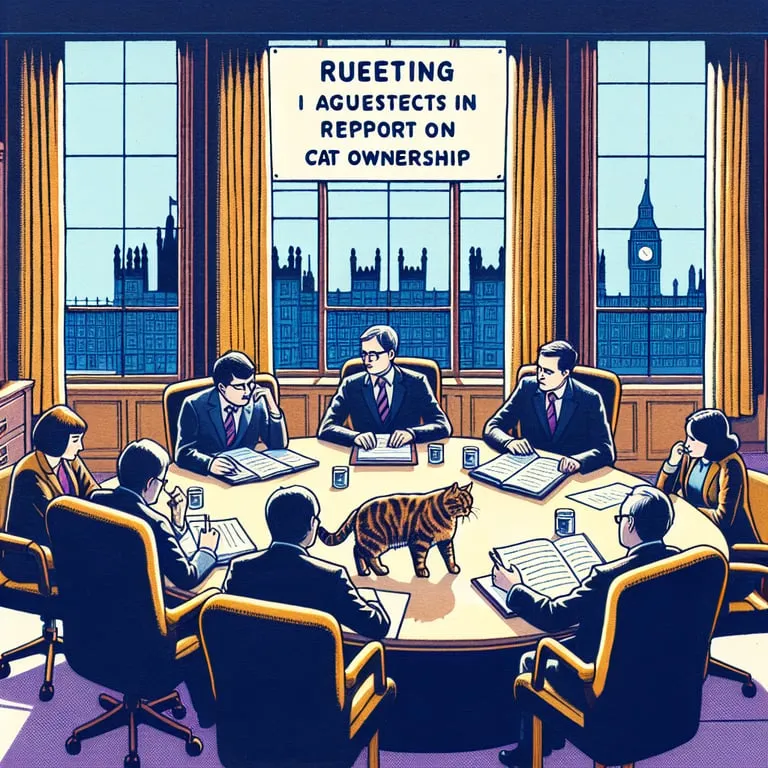The Scottish Government has recently faced backlash over the financial details of a controversial report regarding potential restrictions on cat ownership, inciting considerable public interest.
The Financial Outlay of the Report
One of the most pressing questions surrounding this contentious topic is the cost incurred by taxpayers for the production of the report. Preliminary analysis reveals that the total expenditure was £990.62. This amount primarily covers expenses associated with the APS Group’s web conversion and online publication of the document. Given the current climate of economic challenges and rising taxation levels, such allocation of funds has raised eyebrows among taxpayers, who are increasingly wary about government spending. The question remains: Is this a prudent use of public resources?

What the Report Entails
Titled “Responsible ownership and care of domestic cats in Scotland,” the report posits that cat ownership could potentially be prohibited in certain regions to protect local wildlife. Drawing from international examples—most notably Australia, where certain locales impose restrictions on pet cats—the report hints at an intriguing, albeit controversial shift in regulatory trends.
Government’s Response to Public Concern
In the aftermath of this report’s release, government officials, particularly John Swinney, have publicly refuted any intentions to implement such a feline ban. He characterized the notion as “absurd,” aiming to reassure cat owners and quell rising anxiety surrounding government intervention in pet ownership. However, one must ponder whether this firm denial is enough to quell public concern regarding the implications of the report.
Criticism from Political Figures
The public response has been overwhelmingly critical, especially among opposition parties. Craig Hoy, the Scottish Tory Shadow Finance Secretary, has vocally criticized the Scottish National Party (SNP) for what he terms “pointless exercises” like this report. In a time marked by soaring living costs and some of the highest tax rates in the UK, many constituents are beginning to express serious concerns about government expenditure priorities.
Public Sentiment and Wildlife Concerns
The societal implications of this report have further exacerbated already heated discussions about ecological responsibility versus personal freedoms. Experts agree that domestic cats can significantly impact wildlife populations through predation, a factor the report underscores. Yet, as discussions advance, ethical considerations emerge about the ownership rights of individuals versus the necessity of wildlife protection.
The Tension Between Personal Freedoms and Government Intervention
This incident has sparked a larger debate regarding the role of government intervention in the private lives of citizens. At what point do regulatory measures infringe upon personal liberties? While the ecological ramifications of cat ownership warrant examination, many citizens are left questioning where the line should be drawn between public interest and individual rights.
The Broader Political Context
The report places the SNP leadership under increased scrutiny, stirring up political discontent and scrutiny of governmental priorities. As citizens grapple with the implications of this report, the political landscape evolves in tandem, underscoring the vital importance of transparency and accountability in public expenditure.
Implications for Future Governance
As this debate unfolds, it serves as a reminder of the delicate balance required between various societal interests. Will this report catalyze calls for more stringent regulations regarding pet ownership, or will it energize a movement to protect personal liberties? Only time will tell.
In conclusion, the fiscal details surrounding the Scottish Government’s cat ownership report, while minor in the grand scheme of public finances, reflect broader societal questions regarding prioritization and governance. The mixed messages from senior SNP figures only serve to fuel public skepticism. While wildlife conservation is undeniably crucial, the implications of restricting cat ownership raise pertinent ethical questions. Citizens deserve clarity on how their funds are being spent and should have their voices heard in discussions that significantly affect their rights and personal freedoms. The ongoing dialogue about sustainable governance and responsible pet ownership will undoubtedly shape future policies, ensuring that both the interests of wildlife and the rights of individuals remain at the forefront of public discourse.
https://www.petmediapress.com/